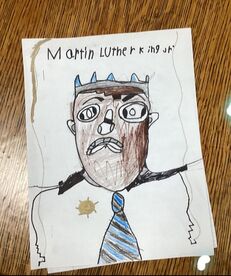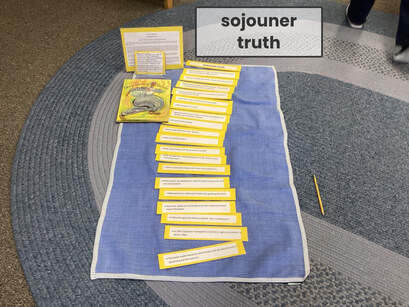 We recognize February as Black History Month and how the month honors those who have endured centuries of struggle and continue to fight for civil rights. Negro History Week (as it was initially known) originally spanned the birthdays of Abraham Lincoln and Frederick Douglass, two figures pivotal to the abolition of slavery in the U.S. While the first original celebration of Negro History Week was in February 1926, Black History Month was expanded to the entire month of February in 1976. Author, journalist, and historian Carter G. Woodson spearheaded the initiative to establish a whole month of honor. He is known most notably as the "Father" of Black History due to his influential work (Scott, 2011). Today, there are 48.2 million African American people in the U.S.; from 2020 to 2060, Black Americans will contribute to more than 20 percent of the total U.S. population growth (Nielsen, 2020). At Alcuin Montessori, we put great effort into being inclusive and diverse in teaching Black history throughout the year. Still, Black History Month is a time to shine extra light on all Black Americans' outstanding accomplishments and contributions. Research has shown that children form ideas and opinions about race by the age of three, including racial biases due to exposure to media and day-to-day experiences with unconscious segregation (Seville, 2020). Positive and diverse messaging ultimately creates a more empathetic and caring environment, leading to confidence within each child as they get older. At Alcuin, we follow Dr. Maria Montessori's teaching in introducing topics of culture and diversity to promote positive messages on race and differences.  Black history is present throughout the entire Alcuin curriculum, Infant through Middle School. Black musical artists are resounding from the classrooms. Amadou and Mariam, John Coltrane, Bob Marley, Muddy Waters, Earth, Wind, & Fire, Joseph Bologne, and more are making our heads bounce. Hanging on the walls is art inspired by Charles McGee and Elizabeth Catlett. At the Infant and Toddler levels, language and picture cards are displayed of ethnicities worldwide. Filled bookshelves are in every classroom with diverse characters and authors. Works on the shelves are curated to offer various nationalities to represent our world. We design field trips at Alcuin to highlight a variety of cultures and experiences. We may make our way to the DuSable Museum to immerse ourselves in Black history or take a walk over to the public library to admire the stunning work by Kehinde Wiley. The Chicago History Museum has a fantastic exhibit on remembering Dr. King and highlights his time in Chicago. The upper grades have explored the American Writers Museum to read the powerful words of Frederick Douglass. Food is an impactful way for children to connect with history and cultures. Food tells a story and has a history. Sharing the history of soul food is a way to connect to our past. It also highlights the resiliency and creativity of the enslaved of our past and the African Americans of the present. Rice, pork, okra, and greens are the four staples that anchor the Black history of soul food. Preparing and sharing food is a cornerstone of Alcuin's culture. The smell of food from around the world, wafting from different classrooms, is enjoyed many a day. Let's loop it back to books for a minute. Resources have gone digital, but we purposefully expose the children to as many physical books as possible at Alcuin through Middle School. Primary and Elementary classrooms are filled with beautiful picture books with diverse characters and authors. Infant and toddlers have a variety of multi-skin colored board books. Middle School gets into the more profound and complex texts in their literature studies. Some favorites are:
At Alcuin Montessori, we speak truth to the past and use it as a learning opportunity to grow in understanding and expand our minds. Black History Month puts Black history into the forefront and highlights the powerful and extraordinary achievements of the immeasurable contributions of Black Americans, present and past. It lifts the future generation of Black Americans to reach the skies. Nicole Cochrane Junior Elementary Teacher Resources:
References: Nielsen, (2020). Nielsen’s 10th Year African American Consumer Report Explores The Power of The Black Community From Movement to Movement. PR News Wire. Scott, D.M. (2011). Origins of Black History Month. ASALH website. Seville, J. (2020). Adults Delay Conversations About Race Because They Underestimate Children’s Processing of Race. Journal of Experimental Psychology: General. APA.org |
ABOUTA blog by various Alcuin staff members. Archives
September 2023
Categories
All
|
ALCUIN MONTESSORI SCHOOL | 324 North Oak Park Avenue and 6942 W Roosevelt Road | Oak Park, Illinois | 708.366.1882


 RSS Feed
RSS Feed